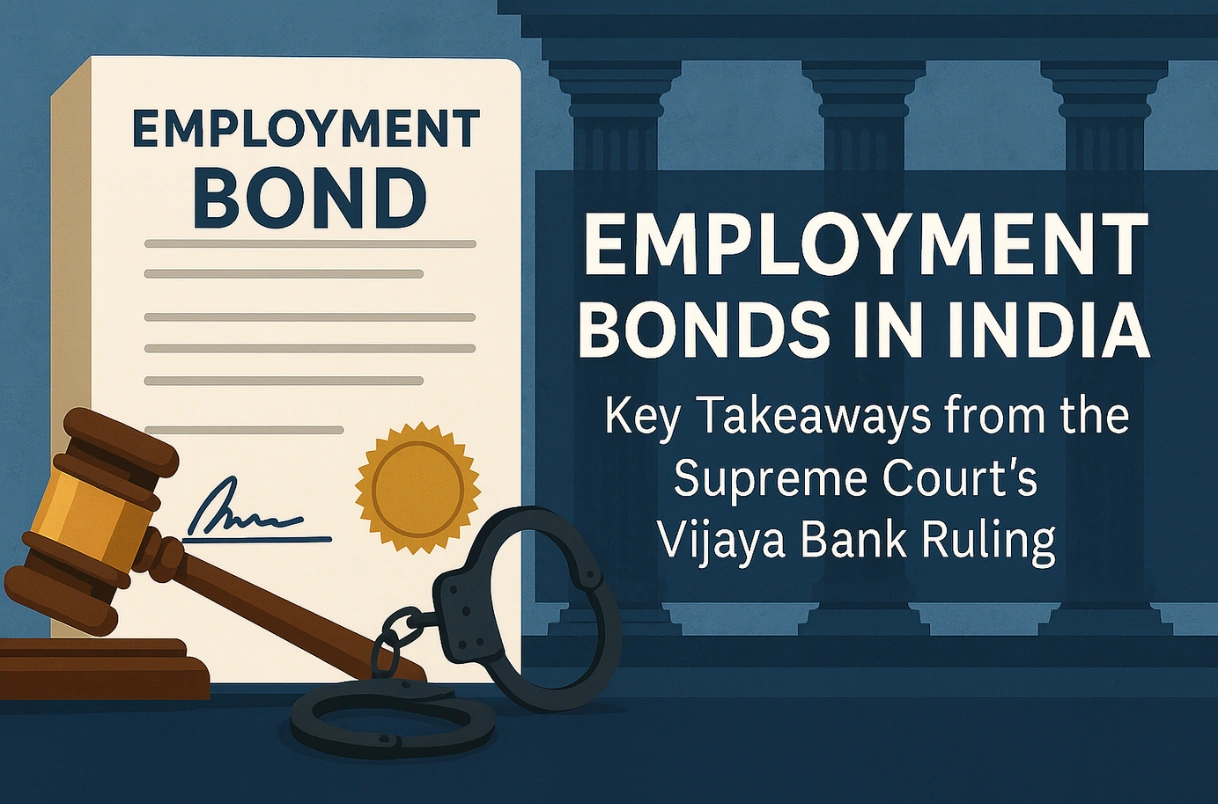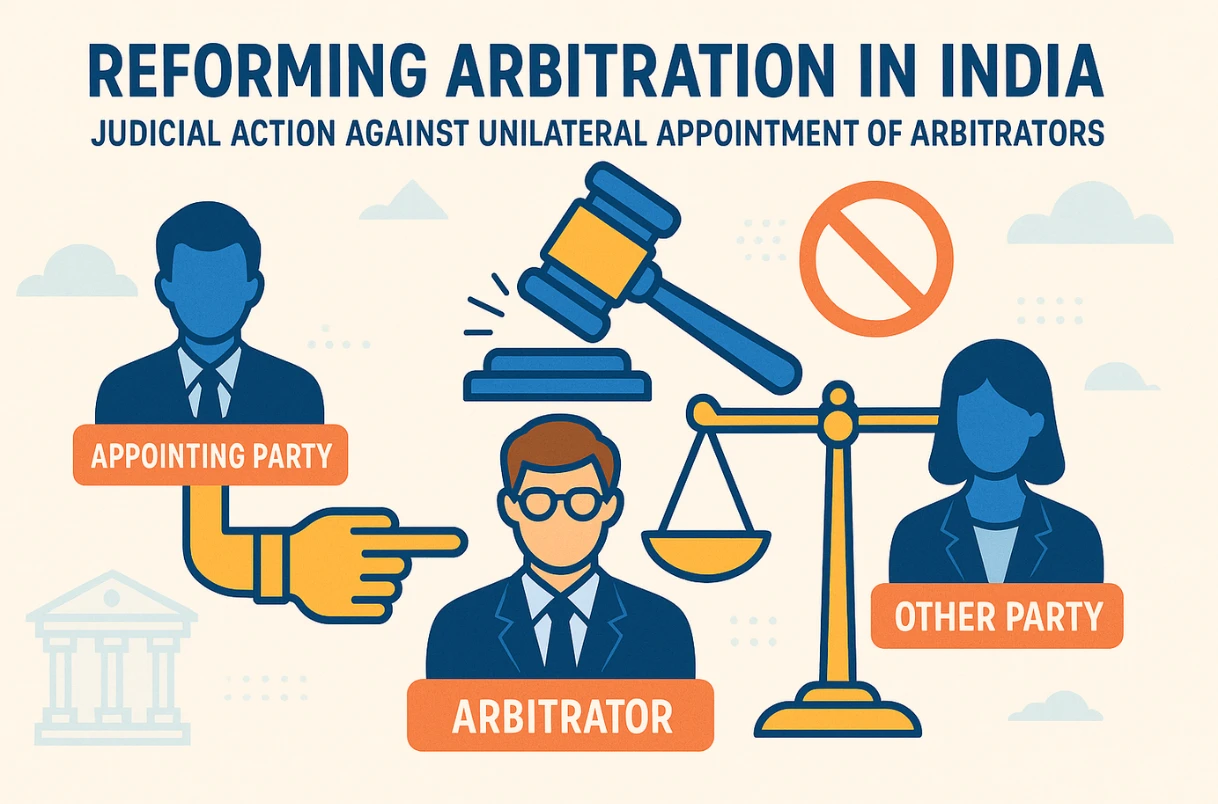Employment Bonds in India: Key Takeaways from the Supreme Court’s Vijaya Bank Ruling

By – Chandan Kumar and Chumthunglo Ngullie
Table of Contents
Introduction
In India’s evolving labour market characterised by rising mobility, specialization, and competition, employers often turn to employment bonds and employment agreements to secure the stability of workforces, particularly where considerable expenditure is incurred on training or early attrition may lead to disruptions.
Typically, an employment bond is a contractual clause, often part of an appointment letter, in which an employee undertakes to serve an employer for a minimum fixed period. A usual provision in such bonds includes that if the employee resigns before the stipulated term, the employee is required to pay a predetermined amount as liquidated damages. Employers have justified such terms on recovery of cost of training, recruitment and costs of productivity.
Such agreements are most common in the banking, IT, aviation, and pharma sectors. They aim to prevent early attrition; help recover recruitment and training costs and ensure continuity in the respective roles.
The issue of the legality and enforceability of employment bonds and employment agreements in India is a legally vexed question when tested against the touchstone of the Indian Contract Act, 1872 (“Contract Act”) and the Constitution of India, 1950 (“Constitution”). The recent judgment by the Hon’ble Supreme Court in Vijaya Bank & Anr. v. Prashant B. Narnaware1 (“Vijaya Bank”) navigates this legal landscape once again, bringing timely insight to legality and enforceability of such contracts.
The Vijaya Bank Case: Background and Legal Challenge
In terms of the appointment letter of the respondent-employee (“Employee”), he was required to pay liquidated damages of Rs. 2 lakhs in the event of leaving employment of the appellant-bank (“Bank”) within a period of three years. An indemnity bond was executed to that effect.
The Employee resigned before the expiry of the three-year bond period and paid the bond of Rs. 2 lakhs under protest to the Bank. Subsequently, the Employee filed a writ petition before the Karnataka High Court alleging that the employment bond was in violation of Articles 14 and 19(1)(g) of the Constitution of India and Sections 23 and 27 of the Indian Contract Act.
The Single Judge bench of the Karnataka High Court ruled in favour of the Employee, which was later upheld by the Division Bench of the Karnataka High Court. Consequentially the Bank was directed to refund the said sum to the Employee. The Bank preferred an appeal before the Supreme Court.
Supreme Court’s Analysis on Employment Bonds
In its judgment dated 14.05.2025, the Supreme Court analysed the employment agreement and bond against the touchstone of:
- Restraint of trade under Section 27 of the Contract Act; and
- Public policy under Section 23 of the Contract Act and Article 14 and 19 of the Constitution.
Restraint of Trade: What Section 27 Really Means
Section 27 of the Contract Act provides that every agreement which restrains a person from exercising a lawful profession, trade or business of any kind is to that extent void. A sole exception is carved out in the proviso with regard to sale of goodwill of a business, in which case the seller may be restrained from carrying on similar business within a reasonable local limit.
The Supreme Court drew a vital difference between conditions applicable during the continuance of employment and restrictions after termination. It reaffirmed its settled position in Golikari2 and Murgai3, and stated that a restrictive covenant operating during the subsistence of an employment contract does not put a clog on the freedom of a contracting party to trade or employment.
It concluded that the object of the employment bond was in furtherance of the employment contract and not to restrain future employment. Hence, it cannot be said to be violative of Section 27 of the Contract Act.
Public Policy and Unconscionable Contracts
Section 23 of the Contract Act declares any contract as void, whose object or consideration is unlawful or against public policy.
The Supreme Court reiterated its view in Brojo Nath4 in the context of interpretation of standard for employment contracts and observed that if such contracts are unconscionable, unfair, unreasonable and injurious to public interest, they shall be deemed void in law being opposed to public policy.
As far as the interpretation of ‘public policy’ is concerned, the Supreme Court, relying on the rulings in Brojo Nath and Golikari, underscored that generally speaking, public policy relates to matters involving public good and public interest. However, what is ‘just, fair and reasonable’ in the eyes of society varies with time. Civilizational advancements, growth of knowledge and evolving standards of human rights and dignity alter the contours of public good and policy. Therefore, even in the context of an employment agreement between employer and employee relationship, the Supreme Court emphasized on the inherent dynamism in the concept of public policy given the liberalization of the Indian economy and the need for public sector enterprises to compete with efficient private players.
It was observed that the restrictive covenant of the employment bond in question must be looked at through the prism of the changing circumstances, especially the need to ensure retention of an efficient and experienced staff in the public sector undertakings. Viewed from this perspective, the restrictive covenant was not held to be unconscionable, unfair or unreasonable and thereby in contravention of public policy.
Assessing the Validity of Liquidated Damages
As far as the issue of liquidated damages of Rs. 2 lakhs was concerned, the Supreme Court noted that being a public sector entity, the Bank did not have the luxury of resorting to private or ad-hoc appointments through private contracts. An untimely resignation would require the Bank to undertake a prolix and expensive recruitment process involving open advertisement and fair competitive procedure.
Moreover, the Employee was enjoying a lucrative pay package and from that perspective, the amount of liquidated damages was held to be not so high as to render the possibility of resignation illusory which was evidenced from the fact that the Employee has in fact paid the said sum upon his resignation from the Bank. Therefore, the quantum of liquidated damages was held to be neither unjust nor unreasonable.
Based on the above, the Supreme Court allowed the appeal and upheld the validity of the employment bond. To sum up, the Supreme Court ruled that:
- The employment bond did not operate in restraint of trade under Section 27 of the Contract Act since the restrictive covenant operated during the term of the employment contract and ceased to have effect post termination.
- It was not opposed to public policy under Section 23 of the Contract Act since owing to specific needs of talent retention by PSUs, the minimum service obligation was neither unconscionable not unreasonable.
- The amount of liquidated damages for breaching the employment bond of Rs. 2 lakhs was just and reasonable considering the expenses for recruitment incurred by public sector enterprises and the pay of the Employee relative to the said amount.
Key Takeaways from the Supreme Court Ruling
The judgment of the Supreme Court in Vijaya Bank provided much needed clarity on how employment agreements and bonds are viewed under Indian contract law.
Firstly, the Supreme Court affirmed that employment bonds are not per se unenforceable and are valid when they operate only during the tenure of employment, are not unconscionable or oppressive, and serve a legitimate business purpose like talent retention. Similarly, such covenants also pass the test of public policy especially in the case of public sector enterprises which have to increasingly compete with an increasingly efficient private sector for talent retention.
Secondly, the ruling also underscores that reasonable liquidated damages, proportionate to actual recruitment and training costs, will not be treated as penal in nature.
It must however be noted that findings of reasonableness of the terms of employment bond were delivered by the Supreme Court in the unique context of recruitments in the public sector.
The justness and expediency of such negative covenants will ultimately depend upon the unique facts and circumstances of each case, especially in the private sector that does not typically suffer from the impediments of a costly and cumbersome recruitment process. Nevertheless, from the point of view of employers, the principle that can be drawn from this judgment is that service obligations in employment bonds can be enforced if the terms thereof subsist during the term of employment and are fair and reasonable and proportionate to the requirements of the employers. Also, the amount of liquidated damages must be reasonable and commensurate with the actual expenses incurred in the recruitment and training process.
Conclusion
The Supreme Court’s decision in Vijaya Bank v. Prashant B. Narnaware brings long-awaited clarity to the enforceability of employment bonds in India. It reaffirms that such bonds, when embedded within the framework of a valid employment agreement, serve a legitimate commercial purpose and are not inherently illegal. Crucially, the ruling distinguishes between reasonable service obligations during employment and impermissible restraints after termination, offering a balanced interpretation of Sections 23 and 27 of the Indian Contract Act. While the judgment was delivered in the context of a public sector enterprise, its broader principles provide valuable guidance to both public and private employers. Going forward, employment bonds that are fair, proportionate, and limited to the term of employment are more likely to withstand judicial scrutiny, provided they do not compromise employee rights or public interest.
FAQs
-
What is an employment bond?
An employment bond is a contractual provision, often part of an employment agreement, that requires an employee to serve an organization for a specified minimum period. If the employee chooses to resign before completing this term, they may be required to compensate the employer by paying a predetermined sum, usually referred to as liquidated damages. These bonds are commonly used in sectors such as banking, IT, aviation, and pharmaceuticals, where employers invest substantially in training and onboarding and seek to reduce early attrition.
-
Are employment bonds enforceable in India?
Yes, employment bonds are generally enforceable in India, provided they comply with the legal standards laid down in the Indian Contract Act, 1872. The Supreme Court, in the Vijaya Bank ruling, confirmed that such bonds are not per se invalid. Their enforceability depends on whether they apply during the employment term, serve a legitimate business interest, and do not impose post-employment restrictions that could be construed as a restraint of trade.
-
How does the Supreme Court view the enforceability of employment bonds?
The Supreme Court has upheld the enforceability of employment bonds that are reasonable, operate during the course of employment, and are designed to safeguard legitimate employer interests such as talent retention and recovery of training expenses. In the Vijaya Bank case, the Court emphasized that such bonds are not violative of Section 27 of the Contract Act or public policy under Section 23 if they do not obstruct future employment and are not unconscionable or oppressive.
-
What factors make an employment bond enforceable in India?
For an employment bond to be enforceable, it must satisfy several conditions: it should be operative only during the tenure of the employment agreement, not impose post-employment restrictions, reflect a legitimate business objective such as securing return on training investments, and prescribe liquidated damages that are reasonable and proportionate. If these criteria are met, courts are likely to uphold the bond as valid under Indian law.
-
Can an employment bond be declared void in India?
An employment bond can be declared void if it is found to be in restraint of trade after employment ends, or if its terms are so unfair, one-sided, or harsh that they are considered unconscionable or against public policy. Under Sections 23 and 27 of the Indian Contract Act, any agreement that is either contrary to public interest or imposes unreasonable restrictions on a person’s right to trade or profession may be rendered unenforceable.
-
What is the role of liquidated damages in employment bonds?
Liquidated damages in employment bonds serve as a pre-estimate of the financial loss an employer might suffer if an employee exits before the agreed-upon period. The enforceability of such clauses depends on whether the amount is reasonable and reflects actual or foreseeable expenses, such as recruitment and training costs. In the Vijaya Bank ruling, the Supreme Court upheld a liquidated damages amount of ₹2 lakhs as fair and not punitive, given the nature of public sector recruitment.
-
What is the difference between restraint of trade and an employment bond?
Restraint of trade typically refers to any contractual provision that prevents a person from engaging in lawful work or business, particularly after employment has ended. Employment bonds, by contrast, are designed to operate during the course of employment and do not usually restrict future job opportunities. The Supreme Court has clarified that bonds which apply only during the tenure of employment do not constitute a restraint of trade under Section 27 of the Contract Act.
-
How does the Indian Contract Act impact the enforceability of employment bonds?
The Indian Contract Act governs the enforceability of employment bonds primarily through Sections 23 and 27. Section 23 invalidates contracts that are opposed to public policy or are unconscionable, while Section 27 renders void any agreement that restrains a person from engaging in a lawful profession. Employment bonds that serve a legitimate purpose, are fairly constructed, and do not restrict future employment can still be valid under this framework.
-
Are employment bonds in the private sector treated differently than in the public sector?
While the legal principles governing employment bonds are the same across sectors, courts may evaluate their reasonableness differently based on context. In the public sector, where recruitment processes are often more complex and costly, courts may be more accepting of service obligations and compensation clauses. In contrast, private sector employers, who typically have greater flexibility in hiring, may face more scrutiny regarding the proportionality and fairness of such bonds.
-
What steps can employers take to make employment bonds legally enforceable?To ensure that employment bonds are legally enforceable, employers should draft them carefully within the employment agreement, ensuring the obligations apply only during employment. The minimum service period should be reasonable, the purpose clearly stated, and the amount of liquidated damages proportionate to actual costs incurred. Employers should also avoid clauses that restrict employees after termination, as these may be seen as violating the right to trade or profession.
References
- 2025 SCC Online SC 1107
- Niranjan Shankar Golikari v. Century Spinning and Manufacturing Co. [1967 SCC OnLine SC 72].
- Superintendence Company (P) Ltd. v. Krishan Murgai [(1981) 2 SCC 246].
- Central Inland Water Transport Corporation Ltd. v. Brojo Nath Ganguly [(1986) 3 SCC 156]


